|
5 Belgian Universities in the World’s Top Universities Ranking (No.32)
11th of October 2013
It is well known in continental Europe that the level of higher education institutions (universities) in Belgium is high, but I understood this the other day when I saw the World University Ranking (2013-2014) published by “Times Higher Education”. Some people seem to think that the Anglo-Saxon universities in the ranking published by this British institution are evaluated slightly too high. In fact, among the top 200 universities, the American and British universities only account already for 108 universities. As for Japanese universities, the University of Tokyo and the University of Kyoto are ranked within the top 100, and even if we add the Tokyo Institute of Technology, the University of Osaka and the Tohoku University, only 5 universities are ranked within the top 200. So, what about Belgium? The Catholic University of Leuven (KUL) and the University of Ghent are ranked within the top 100 and the University of Antwerp, the Université Catholique de Louvain (UCL) and the Université Libre de Bruxelles (ULB) are ranked within the top 200. 5 Belgian universities, the same number as Japan, are ranked. Considering that the Belgian population is only 1/11th of the Japanese population, it is amazing. In particular, the KU Leuven (ranked 61st) and the University of Kyoto (ranked 52nd) are at about the same level and are ranked even higher than ENA (Ecole Nationale d’Administration), a prestigious institution of higher education in France (ranked 65th). Well, although the basis on which the ranking is decided on is debatable, it is certain that the Belgian universities are fairly highly ranked worldwide.
< The Mayor of Antwerp’s Noted Trend >
Beginning of this month, Mr. Bart De Wever, Mayor of Antwerp, invited the diplomatic delegations to a lunch meeting. Making good use of a moment between other matters of work, I participated as well and had the opportunity to have a word with the mayor for a short time. The mayor is the party head of the “New-Flemish Alliance (N-VA)”, the most powerful party in the federal parliament and advocates the separation of Flanders (Dutch-speaking area) and the weakened role of the monarchy. Since the N-VA’s influence has increased greatly in recent years, Bart De Wever is the man of the day and this trend has been drawing attention prior to the general elections in May next year. When I asked him about previous visits to Japan, he answered me that he “had never been to Japan”. As he has plans to visit several countries and cities in Asia in autumn next year, I recommended visiting Japan by all means. Mayor De Wever was once a “giant” weighing more than 100 kg, but before last year’s elections, he started a strict diet and turned into a very slim politician. His speech in front of representatives of the diplomatic delegations and the local business community was held in fluent English and the informal talk with each participant took also place in English after that. Generally, not only the politicians, but everyone in Flanders is fluent in English, but still I was surprised at his proficiency in English.
< Two Big Japanese Companies in Belgium: Daikin Industries and Toyota Motor Corporation >
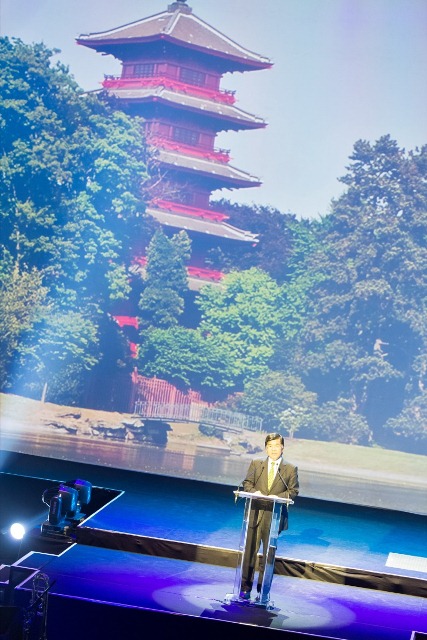 Last week, a big ceremony to celebrate the 40th anniversary of the foundation of Daikin Europe N.V (see Ambassador’s Chat No. 4) took place in Oostende, the westernmost city of Belgium (120 km west of Brussels). Daikin Industries is one of the biggest companies in the world in the field of air-conditioning and refrigeration with more than 80 factories and sales offices worldwide, but the first overseas factory is the factory in Oostende. Daikin Industries, which started in 1924 as a small backstreet workshop called Osaka Metalworking Industry, has grown into a global company with 51.400 employees (in March 2013). In fact, 77 % of these employees are overseas employees. In my speech at the celebration, I mentioned that Daikin Europe was a pioneer in Japanese investments in Belgium and I expressed the hope of further development today after 40 years. At the same time, I asked for further assistance of the Belgian authorities aimed at improving the business environment. Many executives from the headquarters, including Mr Noriyuki INOUE, President of Daikin Industries, attended this ceremony. On the Belgian side, Mr Johan Vande Lanotte, Minister of Economy, Consumer Affairs and the North Sea (Deputy Prime Minister) and Mr Carl Decaluwe, Governor of the province of West Flanders were present. The ceremony that had started in the evening ended at around midnight. It was indeed a grand event with song, dance and even a performance of classical music. Last week, a big ceremony to celebrate the 40th anniversary of the foundation of Daikin Europe N.V (see Ambassador’s Chat No. 4) took place in Oostende, the westernmost city of Belgium (120 km west of Brussels). Daikin Industries is one of the biggest companies in the world in the field of air-conditioning and refrigeration with more than 80 factories and sales offices worldwide, but the first overseas factory is the factory in Oostende. Daikin Industries, which started in 1924 as a small backstreet workshop called Osaka Metalworking Industry, has grown into a global company with 51.400 employees (in March 2013). In fact, 77 % of these employees are overseas employees. In my speech at the celebration, I mentioned that Daikin Europe was a pioneer in Japanese investments in Belgium and I expressed the hope of further development today after 40 years. At the same time, I asked for further assistance of the Belgian authorities aimed at improving the business environment. Many executives from the headquarters, including Mr Noriyuki INOUE, President of Daikin Industries, attended this ceremony. On the Belgian side, Mr Johan Vande Lanotte, Minister of Economy, Consumer Affairs and the North Sea (Deputy Prime Minister) and Mr Carl Decaluwe, Governor of the province of West Flanders were present. The ceremony that had started in the evening ended at around midnight. It was indeed a grand event with song, dance and even a performance of classical music.
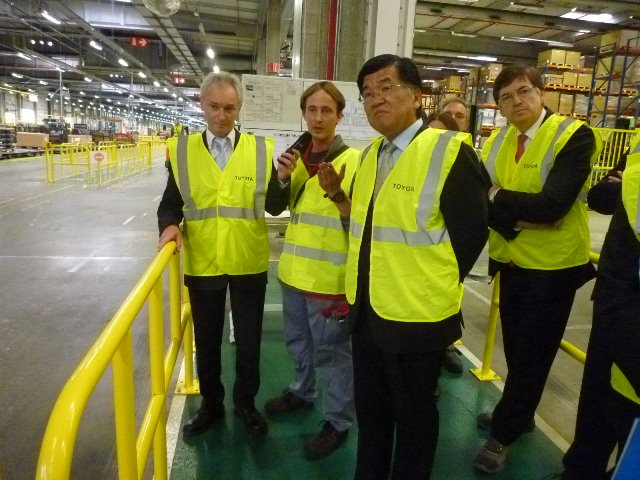 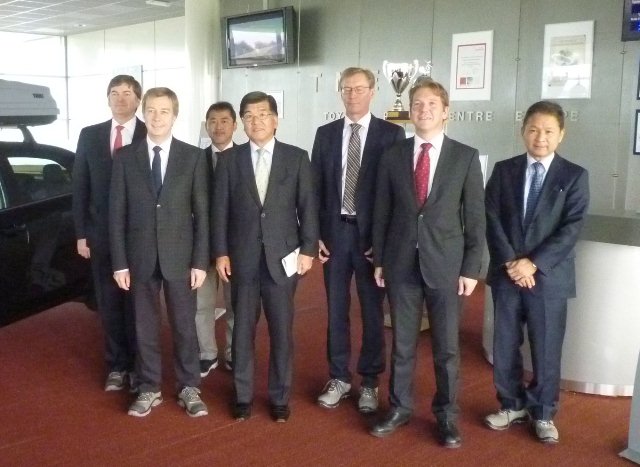 The day before, I had visited the Parts Distribution Centre of Toyota Motor Europe (2400 employees) in Diest (located 60 km northeast of Brussels; 23.000 inhabitants). Although Toyota Motor Corporation does not have a manufacturing plant in Belgium, Toyota Motor Europe was set up in Brussels as the European base. The Research & Development Centre is located in Zaventem and the Logistics Centre in Zeebrugge. After having received an explanation by President Mr. Leroy about the business in general at the Parts Distribution Centre (880 employees), we visited the huge delivery facility where 3 buildings are connected and I was shown how it operates. The total number of parts handled amount to 270.000 units. I was able to verify that all packed parts have a barcode, the same as the trays that carry the part and every time an employee takes in or out a part, the bar code is read by a bar code reader to manage the flow of the parts by computer. The “KAIZEN (improvement) movement” in the company is very thorough and every month an improvement proposal and its implementation status are displayed on the board. We should adopt such a movement in the Embassy of Japan as well. The day before, I had visited the Parts Distribution Centre of Toyota Motor Europe (2400 employees) in Diest (located 60 km northeast of Brussels; 23.000 inhabitants). Although Toyota Motor Corporation does not have a manufacturing plant in Belgium, Toyota Motor Europe was set up in Brussels as the European base. The Research & Development Centre is located in Zaventem and the Logistics Centre in Zeebrugge. After having received an explanation by President Mr. Leroy about the business in general at the Parts Distribution Centre (880 employees), we visited the huge delivery facility where 3 buildings are connected and I was shown how it operates. The total number of parts handled amount to 270.000 units. I was able to verify that all packed parts have a barcode, the same as the trays that carry the part and every time an employee takes in or out a part, the bar code is read by a bar code reader to manage the flow of the parts by computer. The “KAIZEN (improvement) movement” in the company is very thorough and every month an improvement proposal and its implementation status are displayed on the board. We should adopt such a movement in the Embassy of Japan as well.
< The Japanese Ambassador, Lecturer at a FEVIA Seminar >
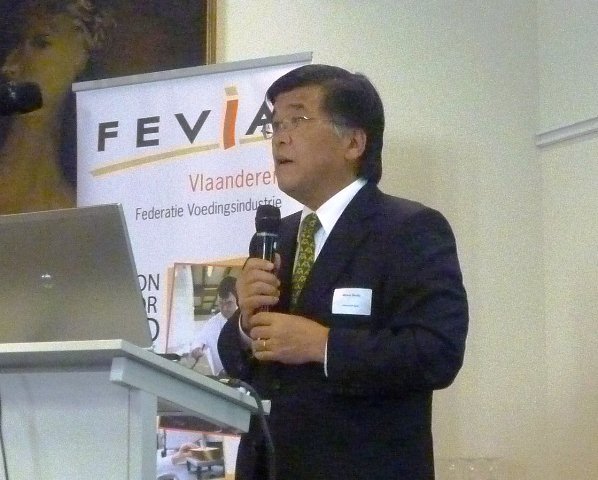 Last week, a seminar on food export by FEVIA was held at a training facility in Elsene on the outskirts of Brussels and I attended as one of the lecturers (?). FEVIA is the “Federation of Food Industry” and at the seminar on that day about 50 food suppliers gathered to learn the knowhow to export food to Japan. As I am not a specialist in food export, I rather pointed out the demands towards foreign products from the viewpoint of the Japanese consumer. I explained that the Japanese are finicky about quality, packaging and safety. I also stated that European products have an image of luxury, so that they should export high quality products even if expensive. Food products that Belgium exports to Japan are chocolate, beer, potatoes (frozen), malt and powdered skim milk, etc. and total exports last year amounted to about 160 million euro (21 billion yen)(9% of the entire export to Japan). The stereotype image that the “Japanese food market is closed to foreign products” still exists in foreign countries, but many foreign food companies are successful in Japan. If a company does some market research in advance and makes the effort to enter the market perseveringly, I think that the company is likely to succeed. In fact, the import of powdered skim milk from Belgium was resumed in 2011 and already they are trading about 6 million euro (800 million yen) per year. It is a world where only those who strive will be rewarded. Last week, a seminar on food export by FEVIA was held at a training facility in Elsene on the outskirts of Brussels and I attended as one of the lecturers (?). FEVIA is the “Federation of Food Industry” and at the seminar on that day about 50 food suppliers gathered to learn the knowhow to export food to Japan. As I am not a specialist in food export, I rather pointed out the demands towards foreign products from the viewpoint of the Japanese consumer. I explained that the Japanese are finicky about quality, packaging and safety. I also stated that European products have an image of luxury, so that they should export high quality products even if expensive. Food products that Belgium exports to Japan are chocolate, beer, potatoes (frozen), malt and powdered skim milk, etc. and total exports last year amounted to about 160 million euro (21 billion yen)(9% of the entire export to Japan). The stereotype image that the “Japanese food market is closed to foreign products” still exists in foreign countries, but many foreign food companies are successful in Japan. If a company does some market research in advance and makes the effort to enter the market perseveringly, I think that the company is likely to succeed. In fact, the import of powdered skim milk from Belgium was resumed in 2011 and already they are trading about 6 million euro (800 million yen) per year. It is a world where only those who strive will be rewarded.
< World Championship Artistic Gymnastics in Antwerp >
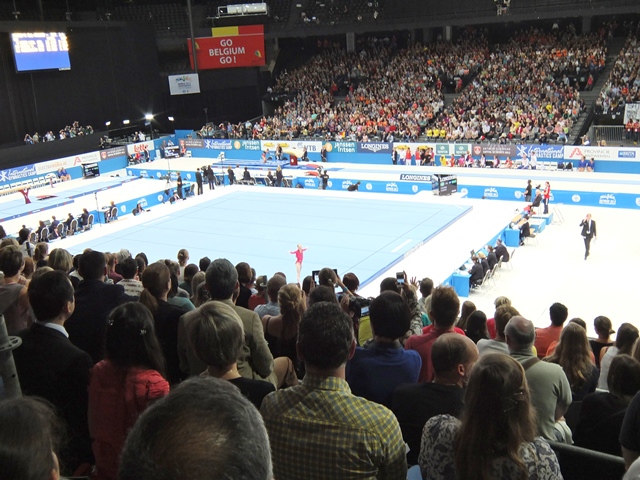 Last week, the World Championship Artistic Gymnastics was held in Antwerp, where Mr. Kohei Uchimura won gold and Mr. Ryohei Kato silver in the Men All-Around. In the Apparatus Finals, Mr. Kenzo Shirai took the gold medal in the Floor Exercise and Mr. Kohei Kameyama took the gold medal in Pommel Horse and Mr. Uchimura again took gold in Parallel Bars. I received an invitation from the organizers and was able to watch the fifth day (Women All-Around). The Antwerp Sports Arena was filled with spectators, applauding and cheering for each gymnast’s performance. Even though I have often watched artistic gymnastics on TV in Japan, it was exciting to feel the tension of the gymnasts and the enthusiasm of the audience at the venue. Two Japanese female gymnasts were qualified for the final and one of them, Miss Asuka Teramoto (17 years old) finished 9th, which is better than her achievement last year in the London Olympics. Although Mr. Uchimura, who won this championship for the 4th time consecutively, is indeed laudable, I realized that even reaching a higher ranking like Miss Teramoto is really hard, after having seen the 24 finalists competing in all earnest at the venue. Last week, the World Championship Artistic Gymnastics was held in Antwerp, where Mr. Kohei Uchimura won gold and Mr. Ryohei Kato silver in the Men All-Around. In the Apparatus Finals, Mr. Kenzo Shirai took the gold medal in the Floor Exercise and Mr. Kohei Kameyama took the gold medal in Pommel Horse and Mr. Uchimura again took gold in Parallel Bars. I received an invitation from the organizers and was able to watch the fifth day (Women All-Around). The Antwerp Sports Arena was filled with spectators, applauding and cheering for each gymnast’s performance. Even though I have often watched artistic gymnastics on TV in Japan, it was exciting to feel the tension of the gymnasts and the enthusiasm of the audience at the venue. Two Japanese female gymnasts were qualified for the final and one of them, Miss Asuka Teramoto (17 years old) finished 9th, which is better than her achievement last year in the London Olympics. Although Mr. Uchimura, who won this championship for the 4th time consecutively, is indeed laudable, I realized that even reaching a higher ranking like Miss Teramoto is really hard, after having seen the 24 finalists competing in all earnest at the venue.
< The Japanese Who Won the Prix Littéraire Richelieu >
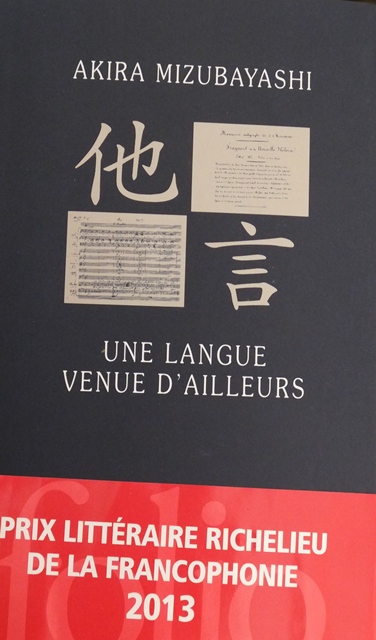 Last weekend, the award ceremony of this year’s “Prix Littéraire Richelieu de la Francophonie” took place in the Maison de la Francité in Brussels. As the award winner is the Japanese Mr Akira Mizubayashi, I attended this ceremony as well. I did not know the “Prix Littéraire Richelieu de la Francophonie”, which is not surprising because it is a new French literary prize created only 4 years ago by the international organization called the “Richelieu Club” headquartered in the province of Quebec in Canada. The prize is awarded to French works written by authors whose native language is not French. Mr Mizubayashi is a Professor in French Literature and Ideology at the Sophia University. The prize-winning work is a book titled “Une Langue Venue D’Ailleurs”, an autobiographical work that reflects the French life of the author. In addition to officials of the Royal Family and Mr Didier Reynders, Minister of Foreign Affairs (Vice Prime Minister), the award ceremony was also attended by many literature lovers. Among those attendees, Mr Mizubayashi gave his acceptance speech in very fluent French. I met Mr Mizubayashi for the first time, but we discovered we had one surprising thing in common. In fact, we both studied French at the University of Montpellier in the South of France in exactly the same period (1974-1976). In those days, only a few Japanese students must have been enrolled at this university and yet we did not meet each other on campus. It is indeed a strange twist of fate that those two meet each other nearly 40 years later in Brussels… Last weekend, the award ceremony of this year’s “Prix Littéraire Richelieu de la Francophonie” took place in the Maison de la Francité in Brussels. As the award winner is the Japanese Mr Akira Mizubayashi, I attended this ceremony as well. I did not know the “Prix Littéraire Richelieu de la Francophonie”, which is not surprising because it is a new French literary prize created only 4 years ago by the international organization called the “Richelieu Club” headquartered in the province of Quebec in Canada. The prize is awarded to French works written by authors whose native language is not French. Mr Mizubayashi is a Professor in French Literature and Ideology at the Sophia University. The prize-winning work is a book titled “Une Langue Venue D’Ailleurs”, an autobiographical work that reflects the French life of the author. In addition to officials of the Royal Family and Mr Didier Reynders, Minister of Foreign Affairs (Vice Prime Minister), the award ceremony was also attended by many literature lovers. Among those attendees, Mr Mizubayashi gave his acceptance speech in very fluent French. I met Mr Mizubayashi for the first time, but we discovered we had one surprising thing in common. In fact, we both studied French at the University of Montpellier in the South of France in exactly the same period (1974-1976). In those days, only a few Japanese students must have been enrolled at this university and yet we did not meet each other on campus. It is indeed a strange twist of fate that those two meet each other nearly 40 years later in Brussels…
|

